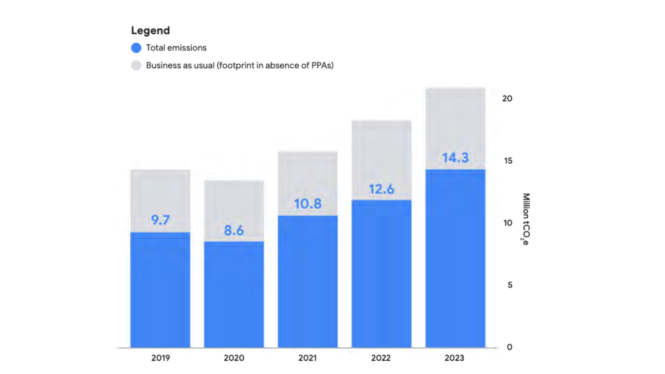
Google just released its annual sustainability report on Tuesday, and the numbers aren’t great. The company revealed its greenhouse gas emissions have increased by almost 50 percent over the last five years, which hasn’t been helped by AI’s considerable energy consumption. It looks like Google has a long way to go before its anywhere near its goal of net zero emissions by 2030.
The most egregious statistic in Google’s 2024 Environmental Report is the tech giant’s whopping 48 percent increase in greenhouse gas emissions compared to 2019, the base year against which the company’s progress is tracked. That’s a 13 percent increase year on year, amounting to 14.3 million tonnes of carbon dioxide equivalent.
For comparison, the average car produces 4.6 tonnes per annum, meaning Google emitted more greenhouse gas than over 3.1 million cars last year.
Google’s report blamed this jump primarily on “increases in data center energy consumption and supply chain emissions.” In short, it comes down to artificial intelligence — an unsurprising culprit considering Google’s AI search summaries alone use 10 times the amount of energy as a standard Google search (as do ChatGPT queries). Like many tech companies, Google has been rapidly implementing AI in practically every area of its business, from its Translate tool to its Photos app.
“As we further integrate AI into our products, reducing emissions may be challenging due to increasing energy demands from the greater intensity of AI compute, and the emissions associated with the expected increases in our technical infrastructure investment,” read Google’s report.
Despite having no intention to slow its AI integration, Google seems blissfully unconcerned about whether it can realistically continue its current course and still reach its 2030 net zero goal. The tech giant stated that it expects its greenhouse gas emissions to temporarily rise before falling, though provided little practical explanation for how the company intends to achieve this. Google even acknowledged that some issues keeping it from its net zero target just don’t have solutions right now.

Credit: Google
That, it seems, is a problem for future Google.
“Our approach will continue to evolve and will require us to navigate significant uncertainty — including the uncertainty around the future environmental impact of AI, which is complex and difficult to predict,” wrote Google. “In addition, solutions for some key global challenges don’t currently exist, and will depend heavily on the broader clean energy transition.”
The company did note that while its total emissions have increased, they’ve done so at a slower rate than the past two years. Still, pointing out that you aren’t polluting as much as you could have been feels like a feeble defence. If Google continues to progress as it has been, it could very well double its greenhouse gas emissions rather than reach net zero by 2030.
Google further cited a 2021 report by Boston Consulting Group claiming that AI has the potential to help reduce global greenhouse gas emissions by five to 10 percent. Specifically, the report stated that AI can cut emissions by analysing areas such as production and transportation to improve efficiency. However, it paid significantly less attention to the emissions cost of AI technology itself. The report was also conducted by members of BCG GAMMA, which sells AI solutions to companies.
In any case, 10 percent is pretty inconsequential when compared to 48 percent.
Google’s 2024 Environmental Report isn’t all bad news. The company stated it replenished around 18 percent of freshwater used by its data centres and offices, tripling the percentage from 2022. It’s still a far way off from Google’s 120 percent goal, but substantially better than six percent. Packaging for new products launched in 2023 were also 99 percent plastic-free, an improvement of three percent.
However, Google backslid in other areas. Food waste diverted from landfill decreased from 85 to 82 percent, while the amount of recycled plastic in Google products fell from 41 to 34 percent.






Leave a Reply